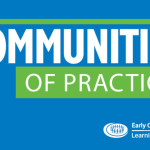
How do you talk about early childhood education and care?
The words we use daily to describe early education matter. Professional language is one way to advocate and begin the changes necessary to support the work we do every day. If we use this professional language every day with children, families and our community—in documentation, in conversations and embedded within frameworks—it will begin to catch on, the messages will get through, and more and more people will start using this professional language without a second thought. It will become the new norm.
ECA observed the varied use of language to describe ECEC which can be confusing and outdated, reflecting the many voices in the early childhood space.
We decided to develop a new resource to set out professional and positive ways to talk about ECEC. We also wanted to build recognition of the important role of ECEC educators and teachers. Our members and focus groups debated many words but everyone agreed the resource was needed.
In response, Early Childhood Australia (ECA) developed and launched ‘How to talk about early childhood education and care’ recently, which includes some examples of language that can be changed.
Simple changes include using words such as ‘children’ rather than ‘kids’ (we are not educating baby goats!); ‘experiences’ rather than ‘activities’; using respectful language such as ‘children with special rights’ instead of ‘children with additional needs’ or ‘children with a disability’.
It also means thinking about why the word ‘friends’ is so commonly used to group children when, as adults, we choose our friends. What are the underlying messages children receive from being grouped with people who are not necessarily their friends? And why are children in early childhood services called by the room they are in, rather than by their name?
While we may think these words are relatively harmless, they reflect an image and send a strong message. It’s important that we view children as individuals, rather than as just part of a group, and that this is made clear by our language.
Some of these phrases you may have heard before, others may be new; however as part of your reflective process we invite you to look at the bigger picture, and perhaps unpack your image of the child and think about the language you use every day.
Professional language is one way to advocate and begin the changes necessary to support the work we do every day. If we use this professional language every day with children, families and our community—in documentation, in conversations and embedded within frameworks—it will begin to catch on, the messages will get through, and more and more people will start using the same language without a second thought.
Educational leaders and mentors play a vital role in role modelling and challenging their colleagues to explore, reflect and use this terminology within all aspects of service life—this includes family day care and outside school hours care services. Ensuring unity of language across the sector stops confusion and makes a powerful—and essential—stand.
How can you use the resource?
- As a discussion topic for a team meeting
- Share it with families
- Display it at your service
- Include it in induction materials for new staff and practicum students
- Provide a copy to visitors to your service such as community leaders and organisations
- Watch the video below to hear how one service is using the resource with families and new staff.
‘How to talk about early childhood education and care’ was launched during Early Learning Matters Week 2021.
____________________________________________________________________
ECA Recommends:
ECA Professional Learning Guide
In this ECA Professional Learning Guide, you’ll find some of the broad work that ECA develops, including great tips for you as you plan for professional learning as an individual, a room team, a service or a collection of services. Our work is mapped to the National Quality Standard (NQS)—as this may help you in your considerations.











Thanks ECA for reminding us about the importance of using professional language. ‘My colleagues’ or ‘our educators’ and not ‘my girls’ is another example.
Whilst I agree with the content of this article, I disagree with the condoning of the phrase ‘children with special rights’. I think the use of the word special in connotation with any person with a disability or otherwise, is patronizing and disrespectful. Furthermore, I would argue that children with disabilities and additional needs do not have special rights, they have the same rights as everyone else. Those rights are just harder to achieve and maintain in most cases, thanks to institutions and individuals who don’t understand, or oftentimes care to understand, how to uplift and encourage those children. Children who grow up to be adults, who probably don’t wish to be referred to as ‘adults with special rights’. Obviously, I’d much prefer to hear members from the disability community speak to this, than myself, a fully abled adult woman. I think the goal of the phrase is to empower children and adults to help to achieve the needs of disabled children but I worry it does the opposite. I also think there’s definitely a better phrase than ‘disabled’ out there too, just not this one.